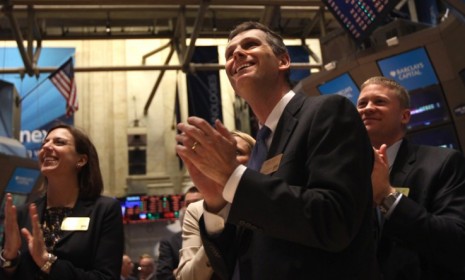The 'epic' bull market: Why are investors shunning stocks?
Stocks have been on a tear for the past three years, but average investors are hesitant to get back on the roller-coaster

A free daily email with the biggest news stories of the day – and the best features from TheWeek.com
You are now subscribed
Your newsletter sign-up was successful
In March 2009, in the midst of the financial crisis, the Dow hit a historic low, falling to levels not seen since 1996 — or 1966 if you take inflation into account. But in the three years since, the stock market has been on an "epic bull run," gaining more than 100 percent in value, says Roben Farzad at Bloomberg Businessweek. Yet lots of investors are still standing on the sidelines — trading volume on the New York Stock Exchange is at its lowest level since 1999. Why? Here, a guide to America's stock market skittishness:
Where are people investing their money?
In the past three years, American investors kept $710 billion in safe bonds, which produce meager returns, and only $260 billion in stocks, according to one study. Plenty of Americans aren't investing at all, preferring to park their money in super-cautious savings accounts.
The Week
Escape your echo chamber. Get the facts behind the news, plus analysis from multiple perspectives.

Sign up for The Week's Free Newsletters
From our morning news briefing to a weekly Good News Newsletter, get the best of The Week delivered directly to your inbox.
From our morning news briefing to a weekly Good News Newsletter, get the best of The Week delivered directly to your inbox.
Why are investors avoiding stocks?
The financial crisis spooked them. It was "the biggest and scariest plunge this generation of investors has ever seen," says Adam Shell at USA Today. And studies show that investors feel the impact of losses much more than the high that comes from profits. "The ability to scare the hell out of people is much greater than the ability to attract them to equities," Brian Barish, a leading investor, tells Bloomberg Businessweek.
Are investors right to be afraid?
It depends whom you ask. Some analysts say that companies are overvalued, and that their share prices are heading for a crash. Others argue that many stocks are still priced too cheaply compared to the profits businesses are posting. Either way, there are plenty of possible risks for the U.S. economy, including a spike in gas prices or an escalation of the European debt crisis. However, the "general consensus" is that the "bull market is alive and well," says Shell. If investors gain confidence and plunge back into stocks, it could "lead the market to new highs," says Bloomberg Businessweek.
A free daily email with the biggest news stories of the day – and the best features from TheWeek.com
What if the economy tanks again?
Despite its huge swings, the stock market has been fairly resilient over the years, says Morgan Housel at The Motley Fool. Investors who bought stocks in 2003 and held on to them gained an average of 5 percent a year — "not bad, considering we suffered the worst recession in 80 years, an oil spike, two wars, financial scandal, global terrorist attacks, record deficits, a downgrade of U.S. debt, and a near shutdown of the federal government."
Sources: Bloomberg Businessweek (2), The Motley Fool, USA Today
-
 How the FCC’s ‘equal time’ rule works
How the FCC’s ‘equal time’ rule worksIn the Spotlight The law is at the heart of the Colbert-CBS conflict
-
 What is the endgame in the DHS shutdown?
What is the endgame in the DHS shutdown?Today’s Big Question Democrats want to rein in ICE’s immigration crackdown
-
 ‘Poor time management isn’t just an inconvenience’
‘Poor time management isn’t just an inconvenience’Instant Opinion Opinion, comment and editorials of the day